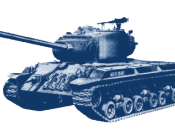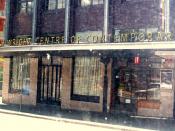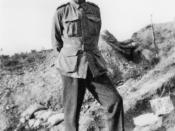Poetry, in its many different forms may been seen as a gateway into the deeper layers of a personÃÂs inner being that allows their thoughts and opinions to be recognized through their writing. This insight allows readers to gain a wider perspective on the views the poet bears on the many themes and issues raised throughout their poetry. In the poems, ÃÂWedding Photograph, 1913ÃÂ and ÃÂThe Old PrisonÃÂ, poet Judith Wright uses strong imagery to comment on the themes and issues present in society, from the devastation of war which is relayed through the use of personification and alliteration, to the impracticality of altering the past showed by the inclusion of symbolism and simile. This in turn conveys to us the mistakes that we have made as a species and how these faults of humanity have lead to severe repercussions over time. Through the rich imagery provided by Wright, we are influenced to form an opinion on the issues raised in her poetry and thereby induce change to the society we currently reside within, and learn from the blunders made by those in the past.
Imagery is displayed throughout many forms of poetry to deliver clear messages to readers that will ultimately influence their reading. It is through such imagery that a poetÃÂs view on particular issues present within society is brought to light. In ÃÂWedding Photograph, 1913ÃÂ, Judith WrightÃÂs views on society in her time was made evident through the insertion of alliteration that contributed to conveying the concept of war, and the devastation it can inflict upon those directly and indirectly involved with it.
ÃÂBut through the smell of a tweed shoulder sobbed-on,Through picnics, scoldings, moralities impartedShyly, the sound of songs at a pianoÃÂ ÃÂWright uses alliteration here to emphasize the emotions that are felt by the persona at this stage in the poem. The shoulder sobbed-on really insinuates the despair felt by the persona, and suggests that it is derived from the repercussions of the war time. It is evident that this poem revolves around issues raised during the war, in particular the devastation it caused to the families involved in it. The persona is used by Wright to create an image of reluctance and sadness associated with the concept of her relatives going off to fight in World War One, and due to the fact that ÃÂWedding Photograph, 1913ÃÂ was written in 1976, during the Vietnam war in which approximately five hundred Australian soldiers died, this could have triggered an emotional retaliation by Wright on the devastation the war was inflicting on not only the soldiers but also their families.
ÃÂIneloquent, side by side, this country coupleSmiling confettied outside the family houseÃÂ ÃÂAgain alliteration is evident to imply the closeness that is felt between the personas parents, a glimpse of what could have been before the ravages of war came into being. War is the reason Wright never grew up knowing who her parents really were or what they were like, and it is apparent through the imagery Wright presents to us that her opinion on war is a negative one, as we see the damage it inflicted upon her young family. Wright implores that we as humanity will come to our senses, and put an end to senseless conflict that only brings devastation to all who it comes into contact with. If we do not, the negative repercussions that will derive from it could be unimaginable.
Within a poem, imagery is depicted to give meaning and express the thoughts and opinions of a poet on particular issues raised in their poetry. The way in which certain imagery is portrayed will impact on the opinions developed by the reader in accordance to the original opinions put forward by the poet. ÃÂThe Old PrisonÃÂ, another poem by Judith Wright, is filled with imagery that relates to readers her view on human conflict during the colonizing of Australia in the 1800ÃÂs, and in particular the mutiny aboard the brig ÃÂTrialÃÂ in 1816 which brought about its destruction. Wright uses the personification of the wind and sea to correlate her thoughts on this issue to that of the natural world that has masked with beauty what was once a place of terrible human suffering.
ÃÂThe rows of cells are unroofed,A flute for the windÃÂs mouth,ÃÂLike ÃÂWedding Photograph, 1913ÃÂ, ÃÂThe Old PrisonÃÂ shares the negative view on the issue of human conflict and war. This is shown due to the fact the Trial Bay Prison this poem refers to, held over 500 German prisoners of war during world war one under horrific conditions. We see this notion of the suffering caused by human conflict through further personification of the wind, as it creates strong imagery that allows us to relate the feelings of the prisoners to the eerie atmosphere of the now ruined prison.
ÃÂThey did not breed nor love,Each in his cell aloneCried as the wind now criesThrough this flute of stone.ÃÂThis final stanza truly portrays the harshness inflicted on those involved in the war through such raw imagery that is made inclusive through the personification of the wind. We are shown the way in which the wind uses the ruin of this once terrible place as an instrument of its emotions, and by doing so we are able to relate to the harshness of the wartime, and thereby develop our own opinion on this issue. By the way Wright displays such strong imagery in her poetry through techniques such as personification, we a presented with her view on human conflict and the devastation it brings, so that we can turn a new leaf in our lives and put an end to the needless suffering it causes.
In poetry, the imagery that is expressed to readers enables us to depict messages within poems along with the views the poet bears on the issues raised. The imagery is used by the poets in an attempt to persuade readers to concur with the opinions they put forward on the issues in their poetry. In ÃÂWedding Photograph, 1913ÃÂ, Wright presents her view on the impracticality of altering the past through the use of symbolism, and how it represents the lost lifestyles that could have been before they were interrupted. The use of symbolism in this poem is made clear even in the title ÃÂWedding Photograph, 1913ÃÂ as we immediately know that this poem is related to events that have happened in the past and that nothing can change the outcome of them. This concept is again reinforced through suggestive comments made involving the photograph as the persona reflects on her early life and the way it was cut short since her parentÃÂs deaths.
ÃÂI see you not through this happy snapshotÃÂs sepiasÃÂ She never thought of that, her second bridegroom, standing there invisible at her right handÃÂ I lift a glass as well ÃÂThe grey-haired daughter whom you did not know.ÃÂSymbolism is indeed strong here, and it helps create an image in the mind of the reader of an elderly lady, peering deep into the lost world of her young parents through their wedding photograph and wishing them a prosperous life even though it is impossible to change what happened to them. Through these symbols, Wright is able to construct her opinion on this issue of altering the past and the pain and controversy that comes with not being able to do so. The imagery created by these symbols also puts across WrightÃÂs view on the past as we are able to witness the frustration and hopelessness produced by the knowledge that the death of her parents could not be changed.
ÃÂI know her better from this averted girlish faceThan in those memories death cut so short.ÃÂIt is clear that the persona here has looked in this photograph many times and pondered what come have been for her family, and in sadness reveals just how little she knew about her mother and yet she has still had an impact on her life, as she mourns the unfairness of death through human conflict. It is therefore imperative that through imagery, individuals will be able to connect with feelings expressed by the poet, so that we are able to learn and thereby cope with such issues.
The use of imagery in any form of poetry assists in relaying the views and opinions of the poet. It is therefore essential to grasp the message that is conveyed to us through such imagery so that we are able to gain valuable knowledge on issues in society and act accordingly. The use of simile in ÃÂThe Old PrisonÃÂ exemplifies the true human nature, one filled with ambition and greed and which ultimately leads to destruction. In 1816, the ship ÃÂTrialÃÂ was stricken by a mutiny among the convicts aboard it as a result of their greed for the ÃÂlootÃÂ on board the ship. Upon finding the wreckage of the Trial, a prison was built and the bay in which it resided was named Trial Bay. With this knowledge, the imagery Wright creates allows us to compare the feelings of that terrible day, to the bay the wreckage and the prison now reside.
ÃÂO dark and fierce day:The wind like an angry beeHunts for the black honeyÃÂWe see here the greed and ambition felt by the crew of the Trial displayed through the wind and sea which now engulf the once grand ship and prison. The black honey represents the greed of man, for it is tinged with evil, and Wright uses the simile of an angry bee to convey her view on this human emotion. Wright shows us that manÃÂs desire for more and the greed that drives this desire will ultimately end in conflict and disaster, as was the case with the ship Trial. Although the prison at Trial Bay is now in ruins, the atmosphere created by the long history within its walls reflects a time of great downfall and human suffering.
ÃÂThe empty shell bone-bare,And like a bone it singsA bitter song of air.ÃÂHere the simile is used effectively to create the image of an old human bone that tells a tale of what was once there and the events that took place there. It also reveals bitter emotions left by those imprisoned in Trial Bay and those whose lives were lost. Wright therefore pleads with humanity to search through our ignorance and see the destruction that follows such things as greed and ambition, and she attempts to influence readers to valuable her opinion on this issue through the well used similes in her poetry that help portray powerful imagery to readers. Through the imagery displayed to us, we may yet find a way to put aside our desires for personal gain, and work together to prevent further unnecessary conflict and destruction in our world.
The reading of poetry based on human activity can better our understanding of the messages it contains on issues within our society. Through the effective use of poetic techniques, imagery is able to be constructed so that readers may be able to relate certain thoughts and emotions to that of the poet. ÃÂWedding Photograph, 1913ÃÂ and ÃÂThe Old PrisonÃÂ, by Judith Wright displayed many powerful examples of imagery through the use of many poetic techniques that helped define Wrights views on issues reflected in her writing, thereby influencing our reading of the poems to better understand her points on these issues. Through the rich imagery displayed in her poetry, Wright attempts to convey messages on society so that one day humanity will learn from its mistakes and avoid the complete annihilation of civilization.





